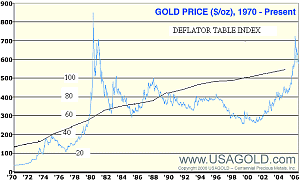|
Shock and AuGovernments wage war on anything and anyone that interferes with their insane wish to dominate everything in sight; they are only about power, for its own sake. Any regular reader of Strike The Root will know this. Still, it's amazing to watch it happen. The latest war, and in some ways one of the most sinister, was launched at the end of April. The owners of E-Gold were indicted for the victimless crime of money-laundering. The jury-swaying sales line was that some of their customers were operators of child pornography. That may or may not be true, but is certainly irrelevant. The obvious real reason lies in the true statement, up-front on their website, that e-gold provides all customers with "better money" that is "backed 100% at all times with unencumbered metal in allocated storage." This, the FedGov can hardly tolerate. If they don't control money--all money--their dreams of empire would be at risk, and that just will not do. As their propaganda makes clear, the thugs are most horrified that money transactions can take place without the benefit of their scrutiny. As clearly as anyone could expect to see, this is an open act of war on privacy. It's not even that the form of money being transferred was gold, in electronic form, rather than the meaningless paper tokens they favor. It's mostly that the transfers have been happening without their knowledge. Oh, horrors! How did mankind survive, all these millennia, while using coins that passed from hand to hand without any government snoop being the wiser? E-gold's CEO and his colleagues will no doubt put up a spirited defense in government court, and the very best of luck to them. But the DoJ has practised hard at jury manipulation, so I can't rate their chances high. Government courts are about policy enforcement, not about justice--or even about law--and the outrageous seizure of the company's operating funds will make it very hard for them to stay in business, or hire legal assistance, which suits the DoJ just fine; they'd be in big trouble if they had to play fair. E-gold's big mistake was to run this highly innovative non-bank bank with a toe-hold in the Land of the Free. Had they kept all their domiciles and offices and assets well outside Uncle's jurisdiction, they would have been harder to hobble. Some of their rivals are doing just that. For those not yet familiar with the merits of gold, nearby is shown a chart of its value compared to that of government paper. The blue line shows the dollar price of gold since 1970, and the black one shows my attempt to overlay what the Feds admit to being their deflator table. The former is more volatile--it reflects what the market thinks the government may do with its currency in the future--while the latter is a record of what has actually taken place, in the past. However, a glance will show that the two show very similar gradients: there has been a relentless erosion of the purchasing power of the greenback, of about three quarters in just those 37 years; $1 now buys what 25 cents did then. Gold, in contrast, keeps its value over huge periods of time with remarkable consistency; one ounce will buy a fine quality suit of clothes today, just as it did in Roman times. When the Age of Government is finally over--in about 2027, by my estimate--gold will almost certainly be the exchange medium the resulting free market society will choose. It's durable, rare, intrinsically valuable, hard to counterfeit, and pretty to boot. Yes, one can fashion a necklace out of $100 bills, but it looks trashy. Average price levels, measured in gold, won't necessarily be constant, for gold is also a commodity in demand for purposes other than money. And during the century when America was on a gold standard, prices actually fell by about 0.5% a year, presumably because productivity increased a bit faster than gold was mined and minted. But for 5,000 years or so, it has proven to be the best option available. Gold does have a couple of drawbacks: it's heavy, and it buys so much that it's very hard to divide into small coins for purchases of low-price, everyday items. Even $70 worth of groceries would take only a tenth of an ounce, and a coin of that size is awfully easy to mislay. So electronic gold will surely have an important place in the free society for which we all yearn. An account such as E-Gold offers, with an associated (and lightweight) plastic card that can be swiped to effect purchases of any amount, down to several decimal places of a gram. The company that the FedGov is on the brink of ruining right now is the one that pioneered just such a money system. It's all part of the war on liberty, privacy, real money and innovation. For now, private systems of electronic money transfer must be seen as vulnerable to government savagery, and the bigger their US footprint, the shorter the life expectancy. The convenience of bypassing the government-controlled banking cartel is so great, though, that many will favor continuing to use E-Gold and its rivals by holding relatively small account balances, while for savings and asset storage physical gold, hidden where no snoop can find or steal it, is now clearly preferable. A nice feature of the E-Gold service has been that of "Redemption"--one can order the company to deliver one's holding in physical form. I hope that can long continue. |
